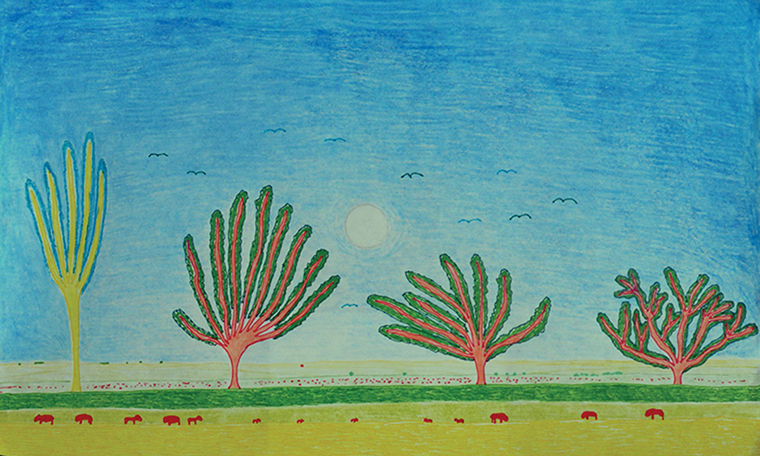Artists overcome adversity through traveling show
Courtesy photos by Suzie Cappa Art Center
Artwork completed by art organizations Project Onward and Hozhoni Foundation will be shown at “The Road Ahead” exhibit on Feb. 19 at the Bridgeport Art Center.
February 15, 2016
Corinne Latorre, who has a developmental disability, entered Sophie’s Gallery in El Cajon, California, five years ago, with little confidence and many fears of artistic failure.
Soon after, her art pieces started selling, and she had two solo shows at a local library and cafe, according to Erin Perschbacher, art program manager at Sophie’s Gallery.
Sophie’s Gallery, along with other collaborators, is scheduled to launch a traveling art show, titled “The Road Ahead,” on Feb. 19 at Project Onward in the Bridgeport Art Center, 1200 W. 35th St. Collaborators are set to include the Hozhoni Foundation in Flagstaff, Arizona; the Suzie Cappa Art Center in Rapid City, South Dakota; and Project Onward Studio and Gallery.
The show will highlight art forms such as abstract and realistic representational pieces created by artists from the foundations who have physical or mental disabilities.
“We wanted to put something together that would travel throughout the country to raise awareness but also highlight the work of these people because they do phenomenal artwork,” said Ashley Kiefer, a merchandising and marketing manager at Suzie Cappa Art Center .
Asked by Suzie Cappa Art Center to start a traveling art show, Kiefer reached out to Wendy Morris, administrator of Sophie’s Gallery, whom she had met at a conference. The two collected work from Chicago’s Project Onward and the Hozhoni Foundation, as well as from their own galleries.
Because Perschbacher is located in California, where the show originated, she was able to see the positive effects the exhibit offered not only to the artists but the community as well.
“One thing that [myself] and a lot of people who saw the show found inspiring was [the] many unique artistic voices among people with developmental disabilities, but there’s also such a common creativity among them,” Perschbacher said. “It’s nice to see that combination of individual voices and a common message that people with disabilities are creative, unique, capable, independent and have something to share with the community. ”
Sandra Tanzer, development consultant at Project Onward, said the program is open to individuals who have a formal diagnosis of a developmental disability.
“In our organization, we emphasize abilities rather than disabilities,” Tanzer said.
The artists are respected, but Tanzer said Project Onward will need to fundraise for shows like these because it costs a minimum of $7,000 to support a single artist per year. That $7,000 goes toward all of the supplies and studio space the artist needs, and the city and government do not contribute financially to the organization.
Tanzer also discussed how the artists are treated as professionals when they go to work because their disabilities do not define them or their art abilities.
“When the gang gets off the fourth floor and comes to the studio every day to work, they are artists,” Tanzer said. “They’re not schizophrenic, on the autism spectrum or delusional. They’re artists first and they’re treated as such, professionally. They’re not students. It’s not a school or a day program for disabled folks; it is a serious art endeavor.”








